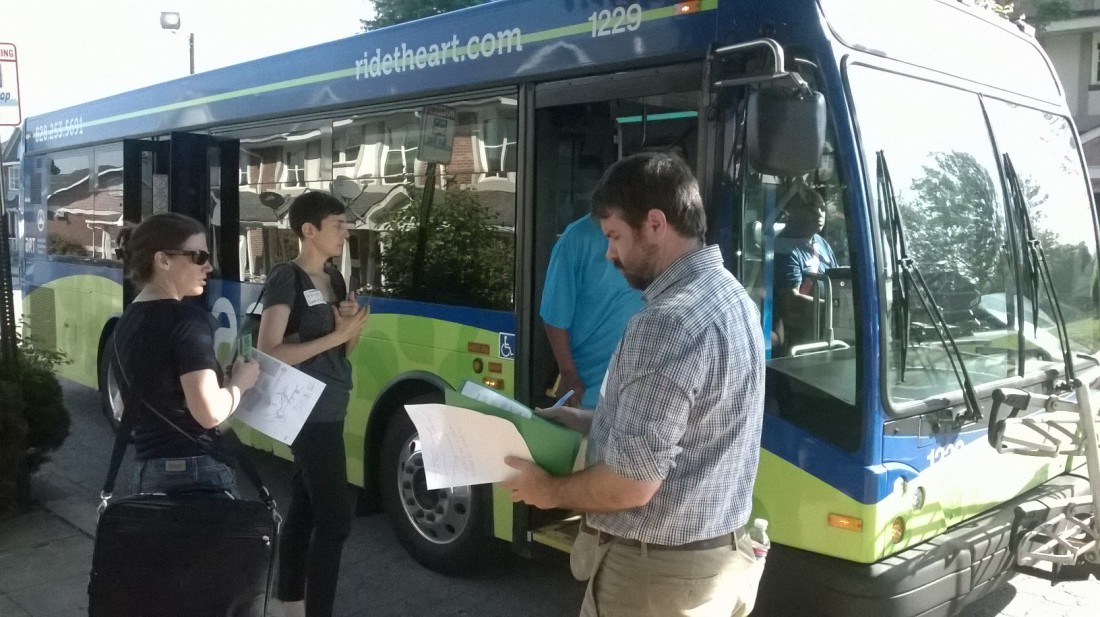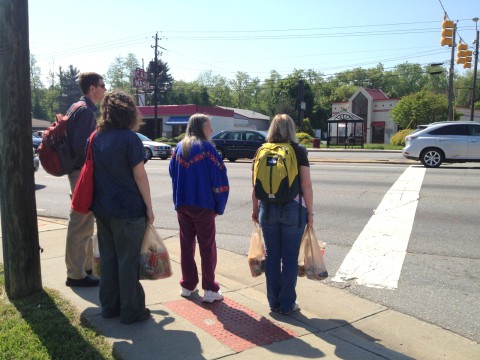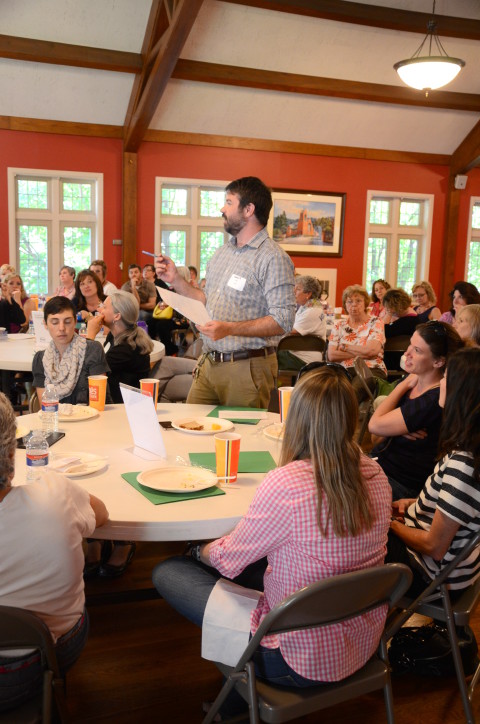Tammy is a single mother of a 19 month-old little girl. She is a “non-elective” bus rider, in that she rides the bus out of necessity rather than choice. “I always use public transportation,” Tammy says.
One of her greatest challenges in riding the bus is with her 19 month-old daughter. “It’s tough. When the bus pulls up, I have to take her out of her stroller and collapse the stroller — all while I’m holding her. Then I have to carry her and the stroller onto the bus, put her on my lap and try to hold her while holding the stroller so it doesn’t get in the way of other passengers. If it’s a long bus ride, she gets fidgety.”
This makes shopping with her daughter impossible, and she has to secure childcare before she can go to the grocery store. “I don’t have enough hands to hold her, grocery bags and the stroller!”
After losing her job at an assisted living facility and unable to find another job, she enrolled in the Work First program. This publicly funded program, administered by Buncombe County Social Work Services, assists with training, work experience and supportive casework services to enable Work First Family Assistance recipients to become self-sufficient and self-supporting. She works at the Children First/CIS Family Resource Center at Emma (FRCE) where she assists with administrative and organizational tasks.
No longer able to afford her current rent, Tammy recently moved to public housing in the Lee Walker Heights Apartments. This move also alters her bus route. “In order to get to the FRCE by 10:00 a.m., I now have to catch the first bus at 7:30 a.m., and transfer to 2 more busses.” She will take 3 busses and travel for almost 3 hours to ride a distance of 5.2 miles.
Asked how she thinks this new route will affect travelling with her daughter, she replies, “It means I will have to get her out in the cold or rain even earlier in the morning, and the stop by our new apartment isn’t covered. We’re going to have to ride on more busses for longer times, and she will be even more restless.”
2014 Child Watch Tour Focuses on Transportation Challenges
To better understand the experiences that Tammy and other non-elective bus riders face, Children First/CIS and the Junior League of Asheville selected public transportation as the theme of the 2014 Child Watch Tour.
The tour is a field trip for adults, inviting participants to “spend a day in a child’s shoes” through experiential learning activities. This year’s Child Watch Tour participants were assigned scenarios based on stories from non-elective riders, such as taking their child to Asheville Preschool and then getting to a job. Twelve groups of participants rode city buses to complete a different scenario.
“It was a mind-blowing experience,” says Mary Jo Deck, a Child Watch participant and first-time Asheville city transit passenger.
After completing their routes, participants re-convened at Trinity Episcopal Church, where they shared their experiences and heard presentations from city staff, public school bus coordinators, and transit advocates. Participants shared their stories of missed buses, difficulty in crossing busy streets with no crosswalks, and a lack of bus stop shelters and sidewalks.
“Our scenario was that we were picking up a sick child with a 102 degree fever from school,” says one Child Watch participant. “We were running from one bus stop to the next on extremely busy roads with no sidewalks, only gravel. I can’t imagine what it would have been like if we really had a sick child with us! It would have been nearly impossible.”
Senator Terry Van Duyn was in a group whose first bus was too full, so they weren’t allowed to board it. “We called in sick to our job because we would have been over an hour late to work.” If this had been a real situation, she could have lost her job.
There were successes as well. “Our driver was extremely helpful and patient with us and all the passengers,” was a sentiment heard from many of the tour’s participants.
The Child Watch Tour asked participants to support policies and funding to improve city bus service, including adding Sunday service. City Council has included funding for limited Sunday bus service in their preliminary budget for FY 2014-15.
“It would cost $350,000 for limited Sunday service, $800,000 for full Sunday service and $10,000 for just one bus shelter. “ sais Julie Mayfield, Chairman of the Asheville Transit Commission, a voluntary board appointed by City Council to represent citizen interests concerning the ART system. “We need a dedicated source of funding for multimodal transportation” so many of these improvements can be made.
About 70 percent of city bus riders depend on the bus for their sole transportation needs, and the need for improvements was instrumental in making the transit system a priority issue in the February City Council retreat. Success Equation partner, Just Economics, helped organize local community leaders and non-elective bus riders to form the People’s Voice on Transportation Equality. This effort resulted in a 19 point People’s Agenda on Transportation, which includes adding Sunday service, adding safety barriers and shelters, and additional areas of service based on needs for transportation to work, school, and basic necessities.
The Success Equation calls all community voices to unite around improved public transportation as a way to ensure that low-income families have the means to access jobs, education, child care, food, and health care. Together we can unite our community to reduce and prevent poverty so all children can thrive.
This story is part of a series collected by The Success Equation. Under the umbrella of Children First/CIS, the Success Equation is an initiative that unites community to reduce and prevent poverty so all children can thrive. Partners include the Cathedral of All Souls, Girl Scouts Peak to Piedmont, Junior League of Asheville, Just Economics, Innovative Partners International, Searchlight Consulting, Smart Start of Buncombe County, Women’s Wellbeing and Development Foundation, and YWCA.
Jodi Ford is the outreach and engagement coordinator for Children First/ Communities In Schools of Buncombe County. To find out more go to find out more, go to childrenfirstcisbc.org or call 786-2072.





Before you comment
The comments section is here to provide a platform for civil dialogue on the issues we face together as a local community. Xpress is committed to offering this platform for all voices, but when the tone of the discussion gets nasty or strays off topic, we believe many people choose not to participate. Xpress editors are determined to moderate comments to ensure a constructive interchange is maintained. All comments judged not to be in keeping with the spirit of civil discourse will be removed and repeat violators will be banned. See here for our terms of service. Thank you for being part of this effort to promote respectful discussion.